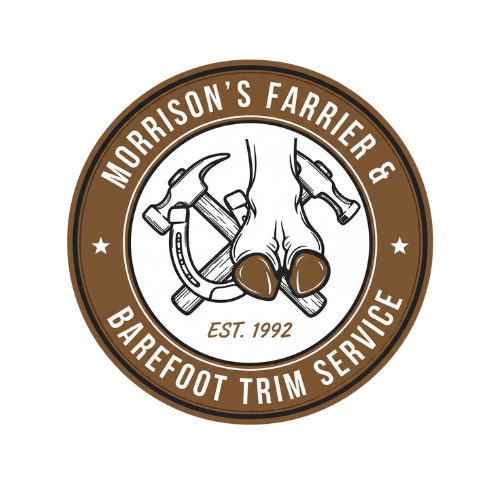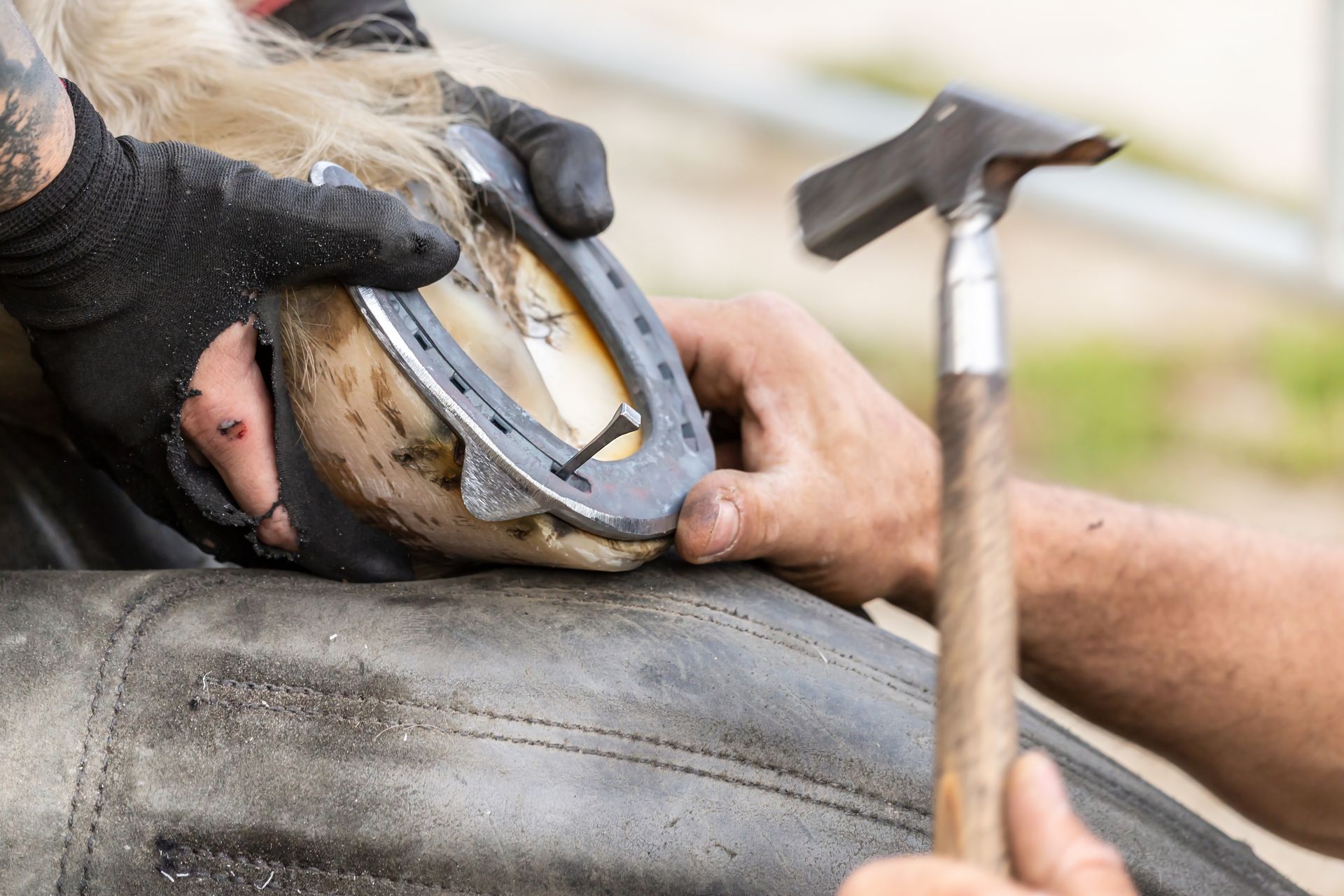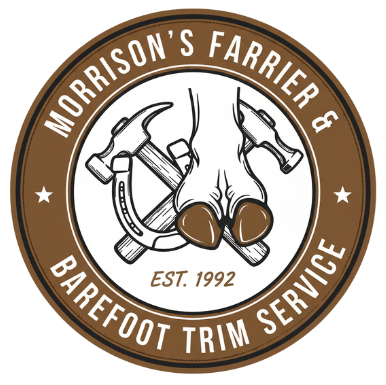
Advanced Hoof Care for Complex Cases
Some horses need more than routine trimming and shoeing. Conditions like laminitis, navicular syndrome, tendon injuries, or high-low hoof imbalances require therapeutic or corrective solutions to restore comfort and support recovery. At Morrison’s Farrier & Barefoot Trim Service, we bring over 32 years of hands-on experience and certification as a master farrier to every therapeutic case.
Our work blends advanced equine podiatry principles with practical solutions, always designed around the individual horse. Whether your horse needs short-term stabilization or a long-term corrective plan, we create custom applications that align with veterinary input and the horse’s comfort.
Why Corrective Shoeing Matters
Corrective shoeing changes the mechanics of the hoof and limb. By adjusting breakover, redistributing weight, or stabilizing weak structures, we reduce stress on injured or compromised tissues. Left unaddressed, imbalances can cause further lameness, strain tendons and ligaments, and shorten a horse’s working life.
Therapeutic farriery is not just about the hoof—it impacts the entire musculoskeletal system. Correct mechanics allow horses to move freely, improve stride length, and regain confidence under saddle.
Common Conditions We Address

Laminitis and Founder
Laminitis compromises the laminae that attach the hoof wall to the coffin bone. In founder cases, rotation or sinking can occur. Corrective shoeing provides mechanical relief, supports the hoof capsule, and encourages healing by reducing leverage forces and protecting sensitive areas.
Navicular Syndrome
Horses with navicular pain often benefit from shoeing that eases breakover and supports the back of the foot. We apply shoes and pads that reduce strain on the deep digital flexor tendon and provide comfort in motion.
High/Low Hoof Imbalances
Horses with mismatched front feet often develop uneven loading patterns. Corrective trimming and shoeing balance the pair, improving symmetry and reducing stress on joints and soft tissues.
Orthopedic and Sport Horse Applications
Performance horses often develop strain-related issues. Corrective shoeing for these cases may include rocker toes, bar shoes, or extended heels designed to prevent further damage while maintaining competitive ability.
Tools and Techniques
Bar Shoes and Heart Bars
These provide increased support and stabilize compromised structures. Heart bars, for example, support the frog to relieve pressure on the laminae in laminitic horses.
Rocker Toes and Rolled Toes
By easing breakover, these modifications reduce strain on tendons and joints, particularly in horses with navicular or arthritic conditions.
Custom Pads and Pour-Ins
Soft support materials distribute load evenly and protect sensitive structures. They can also help prevent bruising and allow horses to stay more comfortable on hard ground.
Glue-On and Composite Options
When nailing is not possible due to poor hoof wall integrity, glue-on and composite materials offer secure alternatives that do not compromise healing.
Collaboration With Veterinarians
We strongly believe that successful therapeutic shoeing is a team effort. We work closely with veterinarians, using radiographs and diagnostic insights to design mechanical solutions that align with medical treatment. This partnership ensures the corrective plan supports the horse’s overall recovery and long-term soundness.
Key Benefits of Our Therapeutic Shoeing
Pain Relief and Comfort
Corrective shoeing immediately reduces stress on compromised structures, giving horses relief from pain and discomfort.
Support for Healing
By improving hoof mechanics, therapeutic applications encourage healthier growth and reduce the risk of further damage.
Restored Functionality
Corrective shoeing allows horses to move more freely, return to work sooner, and regain confidence in their stride.
Long-Term Prevention
Routine monitoring and adjustments prevent recurrence of issues, supporting lasting soundness and performance.
FAQs
How do I know if my horse needs corrective shoeing?
If your horse shows signs of lameness, shortened stride, tripping, or visible imbalance in the feet, corrective shoeing may be necessary. We will perform a thorough evaluation and recommend the best course of action.
How often should therapeutic shoes be reset?
Like regular shoes, therapeutic applications generally require resetting every four to six weeks. Horses with severe conditions may need closer monitoring.
Do you work with veterinarians on therapeutic cases?
Yes. We regularly collaborate with veterinarians, particularly for laminitis, navicular, and other complex hoof problems. Radiographs and medical input are vital in guiding our corrective approach.
Can therapeutic shoeing return a horse to full performance?
In many cases, yes. Corrective applications can allow performance horses to return to training or competition with improved comfort and reduced risk of reinjury.

Choose Morrison’s Farrier & Barefoot Trim Service for Corrective Shoeing
When your horse faces hoof or limb challenges, you need a farrier who combines knowledge, certification, and decades of experience. Morrison’s Farrier & Barefoot Trim Service provides therapeutic and corrective shoeing in Crossville TN and throughout eastern Tennessee. Call (931) 273-1009 or email joshinu21@gmail.com today to schedule an evaluation and give your horse the comfort and support it deserves.
